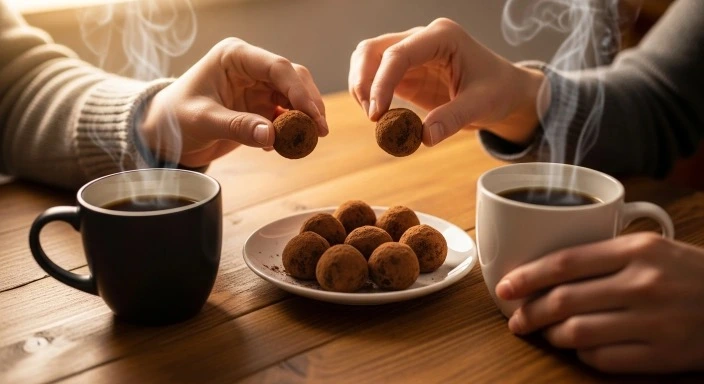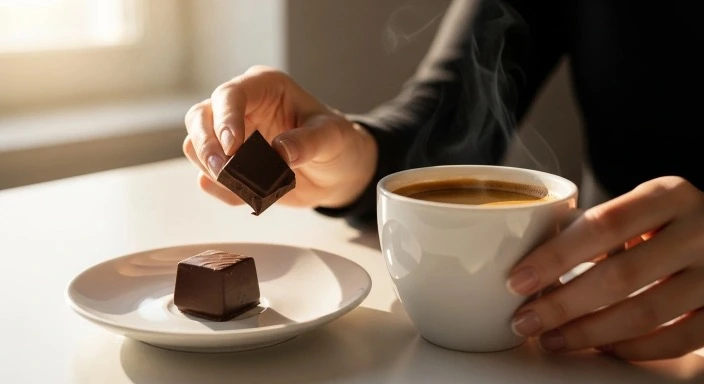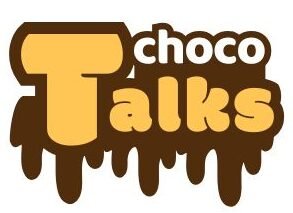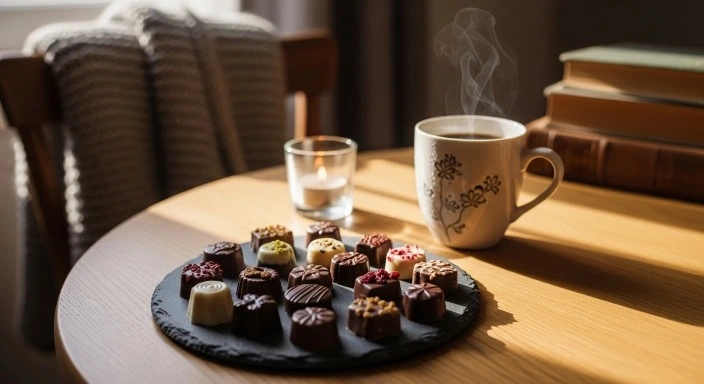Chocs
Some foods comfort us. Others excite us. But chocolate? It has a way of transforming ordinary seconds into little celebrations — a pause between tasks, a tiny triumph after a long day, a sweet companion to laughter and warm conversation. Chocolate doesn’t just taste good; it feels like a moment worth savoring.
There’s a reason chocolate shows up at celebrations, quiet nights in, romantic dinners, and even stressful meetings. Whether we enjoy it as a rich bar, a velvety drink, or a baked treat fresh from the oven, chocolate carries a kind of emotional magic. And now we know it isn’t just sentiment — science supports what our hearts already understood.
In this article, we explore why chocolate makes life feel richer, how it scientifically influences mood, memory, and connection, and why small mindful indulgences with chocolate can truly brighten the day. We’ll also dive into cultural traditions, wellness insights, and chocolate-pairing moments that turn everyday experiences into celebrations.
Chocolate, Mood, and Feel-Good Chemistry
Long before researchers studied it, people intuitively reached for chocolate to feel better. Today, we have data showing chocolate’s effect on serotonin, dopamine, and endorphins — brain chemicals tied to happiness and reward.
Dark chocolate, particularly varieties with higher cocoa content, contains tryptophan, which helps the brain produce serotonin — often called the “feel-good” neurotransmitter. A study published in Frontiers in Nutrition found cocoa flavonoids can support mood regulation and reduce stress markers.
That explains why savoring a square of rich chocolate after dinner feels relaxing rather than indulgent. It aligns with our biochemistry.
Chocs

Chocs
Want to understand how cocoa impacts wellness? See our deep dive in “Is Dark Chocolate Really Healthy?”
Chocolate and Social Connection
Think of movie nights, holidays, birthdays, homemade treats gifted to friends, or the shared dessert at dinner. Chocolate is rarely eaten alone in silence. We often enjoy it alongside companionship — a social ritual as much as a flavor experience.
Chocolate is part of traditions across cultures. In Mexico, rich cacao drinks trace back to ceremonial gatherings. In Europe, chocolate cafés became hubs for conversation and intellectual exchange. And in modern homes, passing around truffles or sharing molten cake is a gesture of generosity and warmth.
A study in the Appetite journal found that sharing food enhances social bonding, particularly when the food is perceived as indulgent or special. Chocolate fits that perfectly — a bit luxurious, deeply satisfying, and somehow intimate.
When we treat someone to chocolate, we’re really saying: “Pause. Enjoy this with me.”
Curious about how chocolate fits into traditions worldwide? Explore “Think You Know Chocolate? 20 Fun Facts That Will Surprise You”
The Science of Comfort and Calm
Chocolate isn’t just emotionally comforting — it has physiological effects that help us unwind. Cocoa contains magnesium, known for assisting relaxation and stress reduction. Some studies have suggested magnesium plays a role in regulating the nervous system and supporting calmness.
Chocolate also contains anandamide, sometimes called the “bliss molecule,” because it binds to receptors associated with pleasure and motivation. Combined with a pleasing sensory profile — smooth melt, rich aroma, deep flavor — chocolate delivers multi-sensory comfort.
That’s why a warm mug of cocoa on a rainy night or a little chocolate square during afternoon fatigue feels grounding and peaceful.
Harvard Health explains cocoa’s mood and brain effects
For a cozy comfort cup, see “Sip the Spirit: How to Make the Perfect Christmas Cocoa”
Everyday Rituals Made Better with Chocolate
Moments become memories through ritual. Chocolate helps us create those rituals naturally.
• A square of dark chocolate after lunch as a mindful pause.
• Chocolate-covered strawberries for quiet celebrations at home.
• A mug of hot chocolate with cinnamon on winter evenings.
• A slice of rich pound cake with morning coffee on a weekend.
Small gestures can redefine the mood of a day.
Chocs

Chocs
Want a show-stopping treat? Try our “The Best Chocolate Pound Cake Recipe You’ll Ever Make”
Chocolate ritualizes pleasure in a world often rushing past delight.
Chocolate and Memory
Research suggests chocolate may help support cognitive performance. A study in the Journal of Nutrition found that flavonoids in cocoa can support memory performance and processing speed. While chocolate isn’t a substitute for a well-rounded diet or brain-healthy routine, it may play a small supportive role.
Think of chocolate as a little gift to your future self — both as pleasure and as nourishment.
Celebrations, Love, and Chocolate
We give chocolate on Valentine’s Day, at weddings, for anniversaries, for graduations, and even as simple tokens of appreciation. Chocolate has become a love language.
Part of this is symbolic: chocolate comes from cacao, historically valued as a gift of vitality and richness. And part is sensory: chocolate feels indulgent, luxurious, thoughtful.
Whether you make a homemade chocolate cake or tie a ribbon around a bar of craft chocolate, you’re gifting emotion, not just sweetness.
For romantic dessert inspiration, explore “How to Make Chocolate Covered Strawberries”
Why Chocolate Creates Mindful Moments
Mindfulness is about presence, and chocolate demands presence. You can’t rush a truffle. You pause, inhale the aroma, savor the melt, taste the complexity. Chocolate slows the world down for a moment.
That’s self-care — not just indulgence.
Even a small daily square can become a grounding ritual. That ritual matters.
How to Enjoy Chocolate Mindfully
Slow down.
Choose quality chocolate.
Let each bite melt fully before the next.
Notice texture, aroma, bitterness, sweetness, and finish.
Pair chocolate with quiet instead of multitasking.
Mindful chocolate is not overeating — it’s savoring.
For those who bake, the process itself becomes meditation: mixing, folding, stirring, waiting. Chocolate teaches patience and reward.
Enjoy elegant calm? Try our mousse recipe in “Easy No-Bake Chocolate Desserts for Every Occasion”
Chocolate and Self-Reward Psychology
Many of us naturally associate chocolate with goals, breaks, or rewards. That’s not a bad thing — in fact, behavioral psychology suggests that small, meaningful rewards reinforce motivation.
When we treat ourselves kindly — with chocolate or otherwise — we support balanced self-regulation, not indulgence without thought. Chocolate becomes a symbol of self-appreciation.
Life gets busy. Chocolate reminds us to pause for joy.
Why Chocolate Belongs in a Balanced Lifestyle
You don’t need to cut out chocolate to live a well-balanced life. Dark chocolate, especially varieties above 70% cocoa, contains fiber, minerals, antioxidants, and phytonutrients.
Moderation lets you enjoy the emotional and sensory benefits without overdoing sugar. A thoughtful chocolate moment is much healthier than mindless snacking.
Chocolate doesn’t need to be “earned.” Joy is part of health.
Final Thought
Chocolate isn’t simply a flavor we love — it’s a companion to life’s moments. It turns conversations warmer, quiet nights cozier, celebrations sweeter, and pauses more meaningful. With every melt and every sip, chocolate anchors us in presence, connection, and pleasure.
So here’s to chocolate. To tiny joys, shared moments, soft evenings, and sweet rituals. To choosing pleasure with intention. To celebrating life one bite at a time.
Chocolate makes every moment better not because it is extravagant, but because it reminds us to savor the moment in front of us.
And that’s something worth cheering for.
Continue the celebration with “10 Surprising Chocolate Facts You Didn’t Know”.
Discover more chocolate wisdom on ChocoTalks.com — where every bite tells a story.

